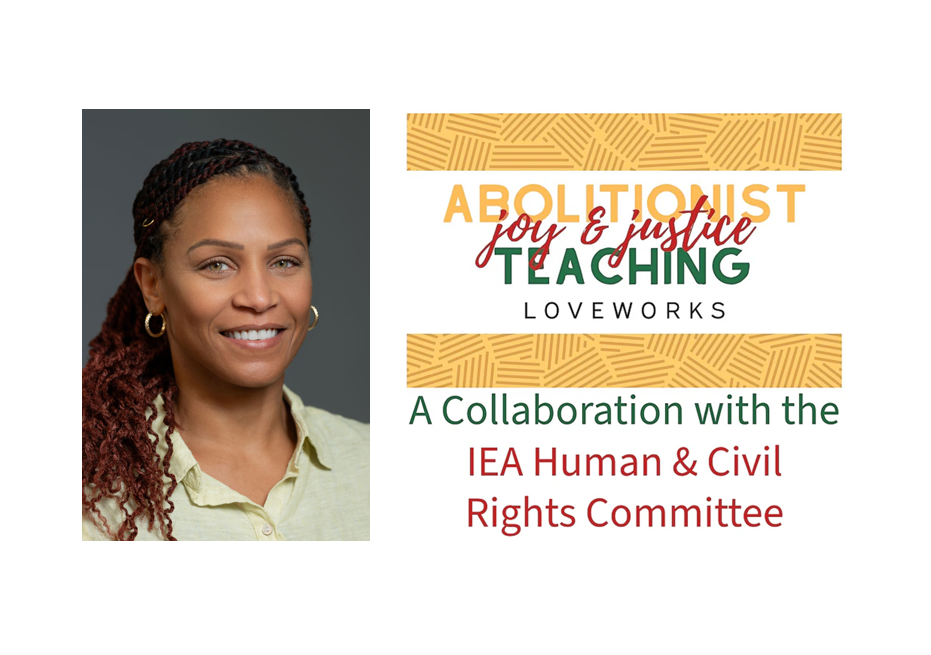Long time IEA leader and member of the IEA Board of Directors, Susan Hudson, has a great story which has led to her educational advocacy work. Read about her story below. Susan and Liz Tibble are the co-hosts of 'Joy & Justice', an asynchronous, on-demand mini course collaboration with the IEA Human and Civil Right Committee. If you haven't already, consider registering for the upcoming "Punished for Dreaming" book study hosted by the IEA Racial & Social Justice department. You can learn more about that here.
Susan Hudson came to education in a roundabout way. Raised by her grandmother, Susan was always told that education was her “golden ticket” to get to wherever she wanted to go. Education in her experience was never positive or negative in her mind, it was merely a means to an end. Upon graduating from high school, she went to college to become an anchor woman, but soon realized that was not the career for her. Instead, she got her first job in marketing and advertising. Working for NASCAR was an adventure that included lots of travel, but after having kids she wanted to be home more. She then went into banking, but found the commute to be grueling and the profession unfulfilling. By chance, a neighbor suggested she substitute at the local elementary school so she could get more time at home with her children. This is when Susan finally had her “aha moment.”
Her first experience was in a kindergarten classroom. “It came easy to me. I spent all my money on those kids, and I fell in love.” With that, she went back to school to get her Master’s in Education with a focus in Special Education. She got into special education because she always found herself drawn to the underdog. She currently works as an assistant case manager over 504 plans and she teaches a special education class that focuses on executive functioning and social emotional learning skills. Her passion for her students is undiminished and she finds joy in mentoring both students and their parents, to ensure they are getting every service to which they are entitled.
After a short time at her school, her local union president suggested she should attend a region council meeting. She didn’t know much about her local or the IEA/NEA, but upon attending was fascinated by the people coming together and the work they were doing. And like with her first teaching experience, dipping her toe into the work, she found herself wanting to be fully immersed.
Susan attended a 2016 professional development at Governors University put on by the Partnership for Resilience. The focus was on adverse childhood experiences. This was a turning point in her educational career. Susan saw how some teachers lacked empathy when dealing with students, especially those with special needs and saw the tactics that were used to keep students out of the classroom. She now puts much of her attention into training new teachers in serving students so that education can continue to evolve to become more inclusive. At her school, Susan currently co-chairs the resilience committee, which focuses on training new and existing staff on adverse childhood experiences and provides professional development through a collaboration with the Partnership for Resilience. She’s also the Region 27 chair, union building representative in her building and a committee member on the State Education Equity Committee.
Most recently Susan, in collaboration with Elizabeth Tibble, facilitated a mini course entitled “Joy and Justice: Abolitionist Teaching” through Opportunity Partners. The course used a podcast style format to highlight key members who are involved on the IEA Racial & Social Justice and the IEA Human & Civil Rights Committee. “Our goal is to highlight their work while also showing the importance of abolitionist teaching and how that would look in your classroom.” It is her hope that through this class, not only will participants be able to ask questions of powerful leaders in a safe space, but also, that they will build relationships.
Together with these relationships, Susan feels that it’s important to always stay focused on the mission. “Wherever we teach we should always remember our ‘why.’ Why we started teaching and the impact we want to make. My hope for educators and schools going forward is that there will be more focus on the whole child. Students don't always have access to mental health and wellness supports outside of school. Parents aren't always aware of the supports that are available. If we can make things easier for students and their guardians to receive the support and assistance they need within the school, it will make a huge difference.”
